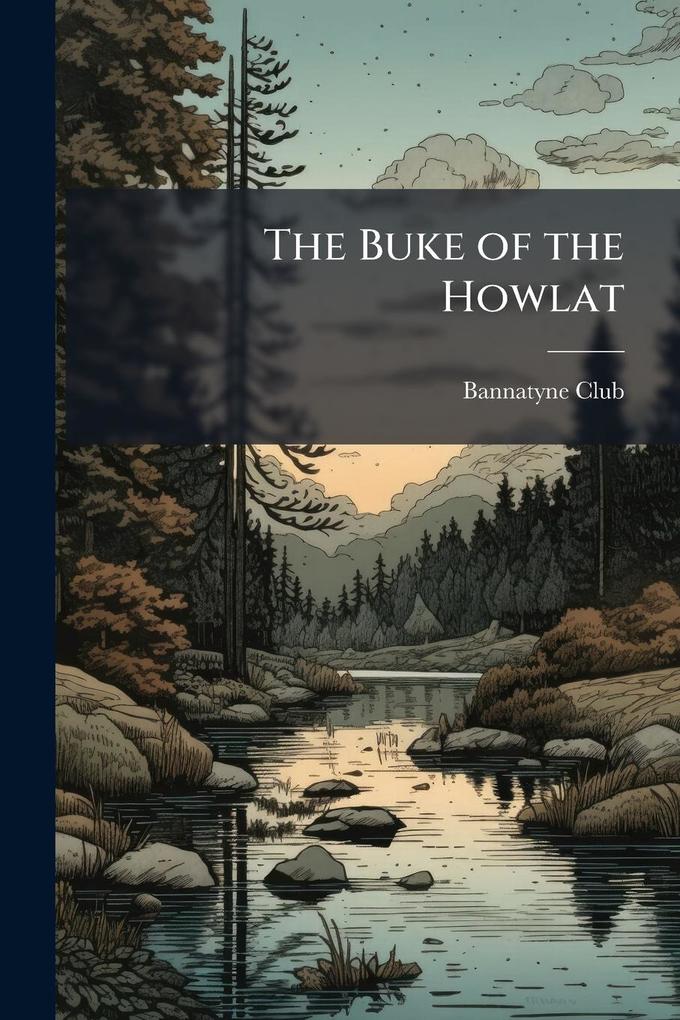
Zustellung: Sa, 26.07. - Do, 31.07.
Versand in 2 Wochen
VersandkostenfreiBestellen & in Filiale abholen:
"The Buke of the Howlat," a Middle Scots allegorical poem, is presented in this edition from the Bannatyne Club. This edition makes accessible a key text for scholars of medieval literature and Scottish history. Written in the fifteenth century, the poem employs vivid imagery and complex symbolism to explore themes of pride, humility, and the nature of true nobility. The poem tells the tale of the Howlat (owl), who, through a series of unfortunate events, learns a valuable lesson about self-awareness and the dangers of vanity.
This edition, prepared by the Bannatyne Club, an Edinburgh-based society dedicated to preserving and publishing Scottish historical texts, ensures the poem's enduring availability to researchers and enthusiasts alike. Its value lies not only in its literary merit but also in its contribution to understanding the cultural and intellectual landscape of medieval Scotland. "The Buke of the Howlat" remains a significant work for anyone interested in the literary and historical heritage of Scotland.
This work has been selected by scholars as being culturally important, and is part of the knowledge base of civilization as we know it. This work was reproduced from the original artifact, and remains as true to the original work as possible. Therefore, you will see the original copyright references, library stamps (as most of these works have been housed in our most important libraries around the world), and other notations in the work.
This work is in the public domain in the United States of America, and possibly other nations. Within the United States, you may freely copy and distribute this work, as no entity (individual or corporate) has a copyright on the body of the work.
As a reproduction of a historical artifact, this work may contain missing or blurred pages, poor pictures, errant marks, etc. Scholars believe, and we concur, that this work is important enough to be preserved, reproduced, and made generally available to the public. We appreciate your support of the preservation process, and thank you for being an important part of keeping this knowledge alive and relevant.
This edition, prepared by the Bannatyne Club, an Edinburgh-based society dedicated to preserving and publishing Scottish historical texts, ensures the poem's enduring availability to researchers and enthusiasts alike. Its value lies not only in its literary merit but also in its contribution to understanding the cultural and intellectual landscape of medieval Scotland. "The Buke of the Howlat" remains a significant work for anyone interested in the literary and historical heritage of Scotland.
This work has been selected by scholars as being culturally important, and is part of the knowledge base of civilization as we know it. This work was reproduced from the original artifact, and remains as true to the original work as possible. Therefore, you will see the original copyright references, library stamps (as most of these works have been housed in our most important libraries around the world), and other notations in the work.
This work is in the public domain in the United States of America, and possibly other nations. Within the United States, you may freely copy and distribute this work, as no entity (individual or corporate) has a copyright on the body of the work.
As a reproduction of a historical artifact, this work may contain missing or blurred pages, poor pictures, errant marks, etc. Scholars believe, and we concur, that this work is important enough to be preserved, reproduced, and made generally available to the public. We appreciate your support of the preservation process, and thank you for being an important part of keeping this knowledge alive and relevant.
Produktdetails
Erscheinungsdatum
22. Mai 2025
Sprache
englisch
Seitenanzahl
100
Verlag/Hersteller
Produktart
kartoniert
Gewicht
150 g
Größe (L/B/H)
234/156/5 mm
ISBN
9781024143249
Bewertungen
0 Bewertungen
Es wurden noch keine Bewertungen abgegeben. Schreiben Sie die erste Bewertung zu "The Buke of the Howlat" und helfen Sie damit anderen bei der Kaufentscheidung.









